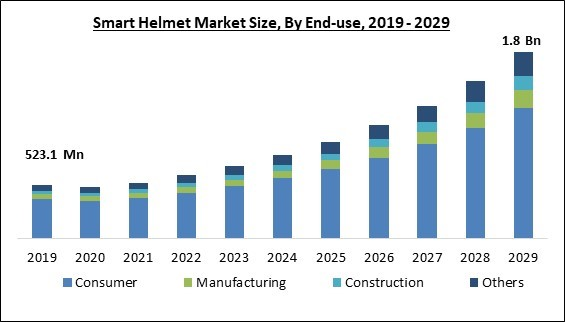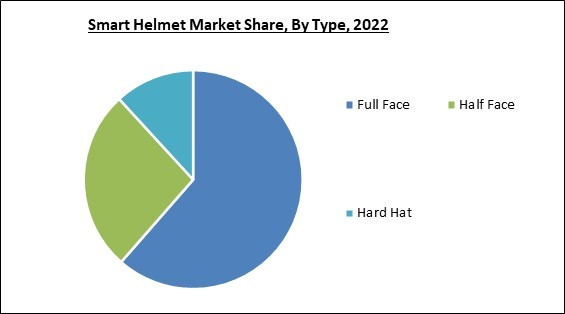Consumers are the major end-users of smart helmets due to the rising sales of two-wheelers and the increased safety concerns. Thus, consumers captured approximately 72% share of the market in 2022. The main cause of impairment and fatalities worldwide, road traffic accidents represent a serious public safety concern. The World Health Organization (WHO) estimates that 1.3 million people die from traffic-related causes each year, and many more suffer injuries or disabilities. The biggest cause of mortality for young adults and children aged 5 to 29 is head injuries resulting from traffic accidents. This has made a modification in the country's helmet policy even more necessary. Governments worldwide are mandating the use of helmets due to the increasing number of traffic accidents. Some of the factors impacting the market are technological developments and innovations in smart helmets, rising use of motorcycles and bicycles to promote adoption, and issues with the usage of smart helmets.
In order to create cutting-edge goods and increase their product portfolios, smart helmet technology companies are investing heavily in R&D operations. The efficiency of the product is being specifically improved, as are customer experiences, with the launch of new products. Sensors and other attached instruments that collect information and help people are built into smart helmets. These helmets have video cameras as well as GPS navigational aids for user assistance. The increased use of motorized two-wheelers is largely responsible for the increase in the number of cars on the world's roadways. It is anticipated that there will be a significant increase in the number of motorized two-wheel vehicles on country roadways in particular.
However, integrating technology in smart helmets can sometimes affect their weight, size, or overall comfort. It may discourage adoption if users find them uncomfortable to wear for extended periods. They may have compatibility issues with other devices or systems. As a result, it can limit their functionality and appeal to potential users if they cannot easily integrate with popular devices, such as smartphones or bike-sharing systems.
Type Outlook
Based on type, the market is characterized into full face, half face, and hard hat. The hard hat segment procured a considerable growth rate in the market in 2022. Due to the rising demand for hard hats in the mining, construction, and manufacturing industries, the hard hat segment is also anticipated to experience considerable expansion in the coming years. Construction industry accidents happen frequently, and occupational injuries are a problem that affects the entire world. In these sectors, smart hard hats are used to spot dangerous gas leaks, track locations in real-time, and assess users' health parameters. Therefore, the growth of the segment is being driven by the goal of enhancing worker safety in hazardous areas.Component Outlook
On the basis of component, the market is classified into communication, navigation, camera, and others (audio systems, health monitoring, lighting, and safety features). The communication segment acquired the largest revenue share in the market in 2022. Smart helmets come equipped with the Integration Communication System (ICS), which enables the bike rider to voice-command all of the devices' features and functionalities. In addition, users who link their smartphones to the smart helmet may use the microphone on the device to make calls and ask for directions, among other hands-free tasks, which is helping the segment expand.End-use Outlook
By end-use, the market is divided into consumer, manufacturing, construction, and others (healthcare, mining, and disaster prevention). The consumer segment witnessed the maximum revenue share in the market in 2022. Bikers all over the world utilize smart helmets in a variety of sporting events. They come with a variety of functions, including an accidental alert system, an integrated Bluetooth system, as well as a solar-powered mobile phone charging system. Consumer interest in adopting smart helmet technology is being stoked by these benefits, which is propelling the segment's expansion.Regional Outlook
Region wise, the market is analyzed across North America, Europe, Asia Pacific, and LAMEA. The North America segment procured the highest revenue share in the market in 2022. The American customer is an early adopter of new technologies, and the American market is comparatively developed. Additionally, manufacturers are concentrating on expanding and improving their product lines in this market. The regional market is expanding as a result of such product releases and key market players' substantial regional presence.The market research report covers the analysis of key stake holders of the market. Key companies profiled in the report include Borderless Incorporated (CrossHelmet), Vista Outdoor, Inc. (Bell Helmets), Forcite Helmet Systems Pty Ltd., Intelligent Cranium Helmets LLC, JARVISH, Inc., LIVALL Tech Co., Ltd., H&H Sports Protection USA, Inc., Sena Technologies, Inc. (Kakao Games Corp.), and Lumen Labs (HK) Ltd.
Scope of the Study
By End-use
- Consumer
- Manufacturing
- Construction
- Others
By Type
- Full Face
- Half Face
- Hard Hat
By Component
- Communication
- Navigation
- Cameras
- Others
By Geography
- North America
- US
- Canada
- Mexico
- Rest of North America
- Europe
- Germany
- UK
- France
- Russia
- Spain
- Italy
- Rest of Europe
- Asia Pacific
- China
- Japan
- India
- South Korea
- Singapore
- Malaysia
- Rest of Asia Pacific
- LAMEA
- Brazil
- Argentina
- UAE
- Saudi Arabia
- South Africa
- Nigeria
- Rest of LAMEA
Key Market Players
List of Companies Profiled in the Report:
- Borderless Incorporated (CrossHelmet)
- Vista Outdoor, Inc. (Bell Helmets)
- Forcite Helmet Systems Pty Ltd.
- Intelligent Cranium Helmets LLC
- JARVISH, Inc.
- LIVALL Tech Co., Ltd.
- H&H Sports Protection USA, Inc.
- Sena Technologies, Inc. (Kakao Games Corp.)
- Lumen Labs (HK) Ltd.
Unique Offerings
- Exhaustive coverage
- The highest number of Market tables and figures
- Subscription-based model available
- Guaranteed best price
- Assured post sales research support with 10% customization free
Table of Contents
Companies Mentioned
- Borderless Incorporated (CrossHelmet)
- Vista Outdoor, Inc. (Bell Helmets)
- Forcite Helmet Systems Pty Ltd.
- Intelligent Cranium Helmets LLC
- JARVISH, Inc.
- LIVALL Tech Co., Ltd.
- H&H Sports Protection USA, Inc.
- Sena Technologies, Inc. (Kakao Games Corp.)
- Lumen Labs (HK) Ltd.










